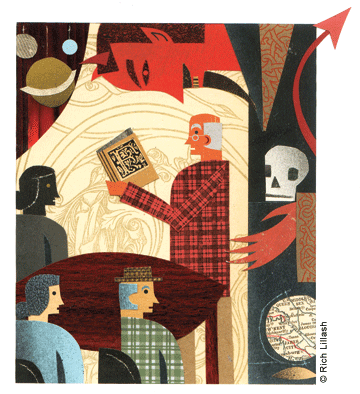
Several times last semester, a few dozen older members of the faculty sat in a closed-off dining room of the University Club to hear some learned variations on the theme of Faust.
Those members of the Penn Association of Senior and Emeritus Faculty (PASEF) listened as Gino Segre, emeritus professor of physics, talked about “Faust in Copenhagen,” the subject of his 2007 book by that name. It explores the pivotal moment in 1932 when the world’s leading physicists gathered in Copenhagen to discuss the charged, world-changing issues of their profession—and to put on a skit: Faust, which the younger members of the group had reworked as a parable about quantum physics. (The role of Gretchen was assigned to a neutrino.)
In the following weeks, the PASEF members heard Simon Richter, professor of German, discuss “The Devil and Daniel Webster,” drawing on the short story by Stephen Vincent Benet and the 1941 film. They listened as Rebecca Bushnell, the professor of English who serves as dean of the School of Arts and Sciences, discussed “Marlowe’s Dr. Faustus: The End(s) of Knowledge.” They lent their ears to Richard Wernick, the Magnin Professor Emeritus of the Humanities, as he presented “Diabolus in Musica: The Faustian Bargain in the Arts.”
It’s probably safe to say that senior and emeritus university faculty are, on the whole, more intellectually engaged than the average members of their generational cohort. So we asked Vivian Seltzer, the professor emerita of human development and behavior who serves as PASEF’s president, about the importance of keeping them involved in the intellectual life of the University after retirement. Not only is it “exceptionally important to the University,” she responded, “but it is one of PASEF’s jobs to acquaint the administration [with] the many needs retired faculty can fill.”
On the other hand, it’s sometimes a challenge to lure professors, especially those who don’t live in Philadelphia, to campus—“hence the need for new intellectually exciting programming, whose major side benefit is renewing old relationships and making new ones among peers.” Helping to fulfill that need was the organization’s spring lecture (“Shades of Freedom”) and reception by former Penn President and emeritus history professor Sheldon Hackney Hon’94. Under Seltzer, PASEF has also launched a program called Researching in the 21st Century.
H. Carton Rogers III, vice provost and director of the Penn Libraries, agreed to speak on recent developments in library technology. The resulting seminar was “eye-opening and exciting,” Seltzer says, noting that Rogers then offered several instructional seminars for PASEF members who “might not be as up-to-date on handling databases, electronics, et cetera.”
While there’s a good deal of work involved in presenting a “robust year of programming,” Seltzer acknowledges, the benefits outweigh the demands. “Encounters with individuals who have spent a lifetime in teaching and scholarship,” she adds, “could be considered one of the bargains that led Faust to make his deal.”—S.H.




